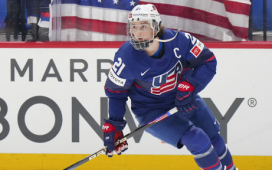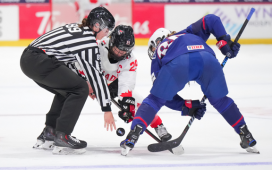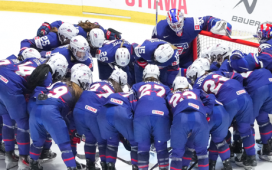Gregory, former GM of the Maple Leafs and one of the first directors of the NHL’s Central Scouting bureau, was a hockey lifer and one of the most beloved people in the game. He passed away Wednesday at 83.

As Jim Gregory’s health declined and he was confined to a hospital bed, the conga line of hockey people coming to visit was continual and strong. NHL commissioner Gary Bettman and deputy commissioner Bill Daly stopped by. His former players, Darryl Sittler, Dave ‘Tiger’ Williams and Lanny McDonald, came to visit. Borje Salming called to check in. So did Lou Lamoriello and Harry Sinden.
Those gestures were all a testament to a man who was a hockey lifer. In a game where bitterness often grows quickly and dramatically, where grudges can last a lifetime, Jim Gregory never had an enemy in the game, never had a negative thing to say about a person, nor did anyone have one about him. “We were just talking about that with him when we were visiting him the other day,” said one of Gregory’s closest friends, NHL senior vice-president of hockey operations Colin Campbell. “I said to him, ‘Jimmy you never said a bad word about Harold Ballard and you deserved to say it more than anybody.’ And he said, ‘Well, you know, he did do some good things.’ ”
The NHL confirmed Wednesday that Jim Gregory had died, less than a week before his 84th birthday. From the time he was cut by the Jr. B team at St. Michael’s College until August when he finally stopped showing up every day at the NHL’s Toronto office, every one of them was spent giving something to the game. He coached at the junior level, winning two Memorial Cups. He scouted players, was GM of the Maple Leafs for 10 seasons, then was one of the first directors of the league’s Central Scouting Bureau. The 2019 draft in Vancouver was the first he did not attend. Like, ever.
You’d think a guy involved in the game that long and at that many levels would make an enemy or two thousand along the way. But that would have required Jim Gregory to have a single strand of malicious DNA in his body, which he didn’t. (A personal aside. Gregory was inducted into the Hockey Hall of Fame as a builder in 2007. At the time, he was the chairman of the selection committee, but was away on medical leave and had nothing to do with the decision. I did not like the decision and thought it still represented a conflict of interest and made no effort to hide my opinion. Gregory never held it against me, offering his hand and a kind word every time we met.)
“Jimmy always found good in people and he was the conscience of the game,” Campbell said. “He was a good man, an honest man and always did all the right things.”
After a successful career as a manager in junior hockey, Gregory joined the Maple Leafs as a scout in 1968, but it wasn’t long before he ascended into the GM’s chair, taking over for the legendary Punch Imlach. The Leafs were entering a lull after a 1960s dynasty that saw them win Stanley Cups from 1962 through ’64 and another in 1967. Despite the challenges he faced working for the bombastic, unpredictable and bottom-line obsessed Ballard, Gregory put together a well-stocked organization, hiring Red Kelly and Roger Neilson as coaches, signing Salming out of Sweden and overseeing drafts that produced the likes of Sittler, McDonald, Williams, Errol Thompson, Ian Turnbull, Mike Palmateer and Randy Carlyle. Just when it looked as though the Leafs were about to turn a corner, Gregory was fired after the 1978-79 season and the Leafs set about putting themselves on a path to ineptitude that lasted more than a decade. McDonald was traded the season after Gregory was fired and Sittler was gone two years later, all the while the Leafs descending to laughing-stock status in the NHL. Gregory found out about his firing when the league called him and asked him to take over the league’s Central Scouting Bureau.
But that stint with the league spanned 40 years. Gregory was a fixture at the draft, where he would announce the picks from the second to seventh round. “Everybody looked forward to Jimmy’s pronunciations,” Campbell said. Well into his 80s, Gregory would dutifully show up at the NHL offices each day, often staying well into the night to watch games with the league’s hockey operations department in the Toronto war room.
“We would start telling him to go home at 7:30 or 8,” Campbell said. “With all the games on there, he’d always have his eye on the Leafs. He’d finally leave about 10 or 10:30. He’d hang in there. He thought he had to work all night with the rest of us and he’d apologize when he had to leave and I’d say, ‘Jimmy, you don’t have to apologize.’ ”
Want more in-depth features, analysis and an All-Access pass to the latest content? Subscribe to The Hockey News magazine.








